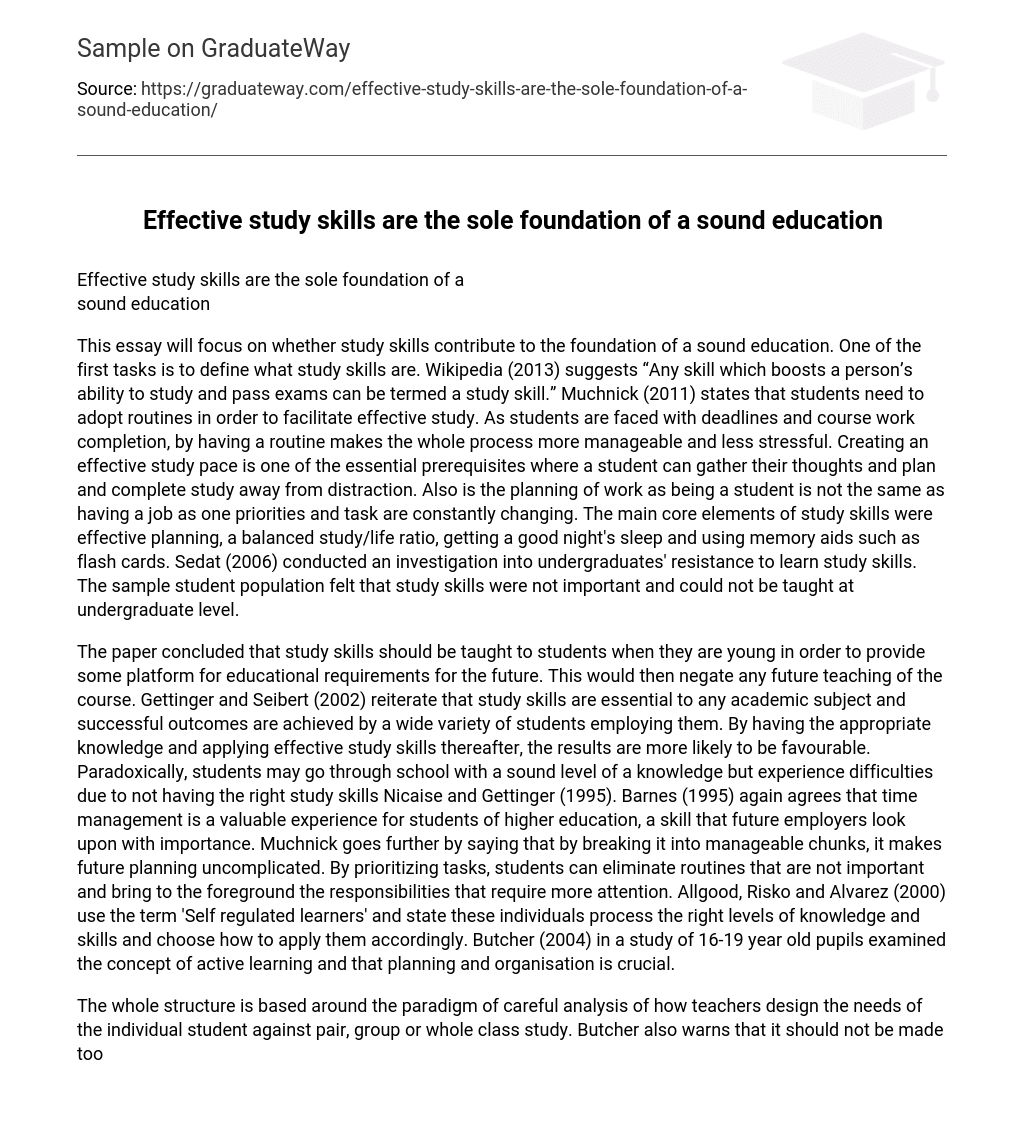Effective study skills are the sole foundation of a
sound education
This essay will focus on whether study skills contribute to the foundation of a sound education. One of the first tasks is to define what study skills are. Wikipedia (2013) suggests “Any skill which boosts a person’s ability to study and pass exams can be termed a study skill.” Muchnick (2011) states that students need to adopt routines in order to facilitate effective study. As students are faced with deadlines and course work completion, by having a routine makes the whole process more manageable and less stressful. Creating an effective study pace is one of the essential prerequisites where a student can gather their thoughts and plan and complete study away from distraction. Also is the planning of work as being a student is not the same as having a job as one priorities and task are constantly changing. The main core elements of study skills were effective planning, a balanced study/life ratio, getting a good night’s sleep and using memory aids such as flash cards. Sedat (2006) conducted an investigation into undergraduates’ resistance to learn study skills. The sample student population felt that study skills were not important and could not be taught at undergraduate level.
The paper concluded that study skills should be taught to students when they are young in order to provide some platform for educational requirements for the future. This would then negate any future teaching of the course. Gettinger and Seibert (2002) reiterate that study skills are essential to any academic subject and successful outcomes are achieved by a wide variety of students employing them. By having the appropriate knowledge and applying effective study skills thereafter, the results are more likely to be favourable. Paradoxically, students may go through school with a sound level of a knowledge but experience difficulties due to not having the right study skills Nicaise and Gettinger (1995). Barnes (1995) again agrees that time management is a valuable experience for students of higher education, a skill that future employers look upon with importance. Muchnick goes further by saying that by breaking it into manageable chunks, it makes future planning uncomplicated. By prioritizing tasks, students can eliminate routines that are not important and bring to the foreground the responsibilities that require more attention. Allgood, Risko and Alvarez (2000) use the term ‘Self regulated learners’ and state these individuals process the right levels of knowledge and skills and choose how to apply them accordingly. Butcher (2004) in a study of 16-19 year old pupils examined the concept of active learning and that planning and organisation is crucial.
The whole structure is based around the paradigm of careful analysis of how teachers design the needs of the individual student against pair, group or whole class study. Butcher also warns that it should not be made too complicated. He emphases that the key to success lies in empowering students to take responsibility for their own learning both by active participation in lessons and by increasing study skills. References
Allgood, Whitney Pitts. and Risko, Victoria J. and Alvarez, Marino C. (2000), “8 Factors That Influenze Study”, in the Handbook of College Reading and Study Strategy Research (Ed) Flippo, Rona F. and Caverly, David C. Mahwah, NJ: Lawrence Erlbaum Associates. p202 Barnes, R. (1995), Successful Study for Degrees, 2nd edition: Routledge, London, p22 Butcher, J. (2004), Developing Effective 16-19 Teaching Skills: RoutledgeFalmer, p108 and p142 Clumeck Muchnick, C. (2011), The Everything Guide to Study Skills: Strategies, Tips, Tools You Need to Succeed in School: Adams Media p22 Yuksel, S. 2006. Undergraduate Students’ Resistance to Study Skills Course.. College Student Journal, 40 (1), pp. 158–165. Nicaise, M. & Gettinger, M. (1995). Fostering reading comprehension in college students, Reading Psychology 16, p283-337 Pearce, R. (1998). Acquiring the Right Study Skills, History Review, p30 USA Today. (April 2000), Students Lack Needed Study Skills, p15 Wikipedia (2013) Study Skills. http://en.wikipedia.org/wiki/Study-skills Bibliography
Cottrell, S. (2013), The Study Skills Handbook, Basingstoke: Palgrave Macmillan





